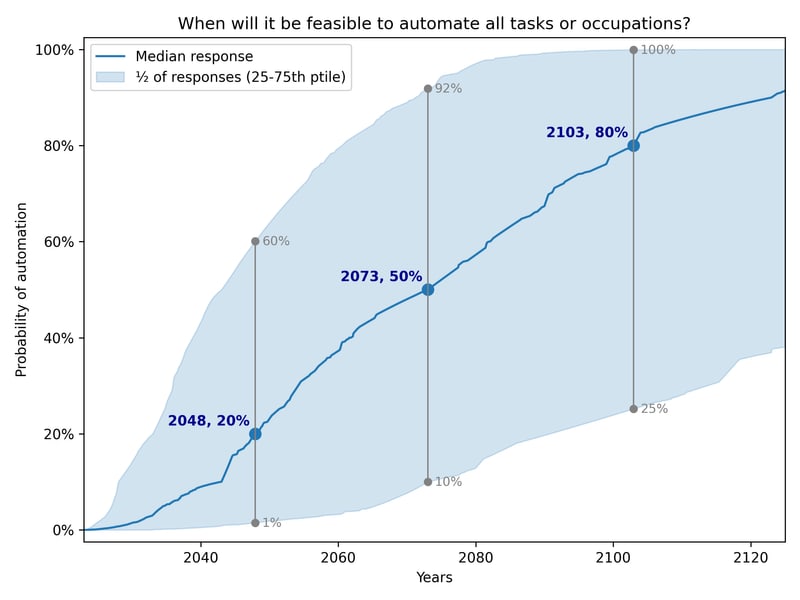In my opinion, we have known that the risk of AI catastrophe is too high and too close for at least two years. At that point, it’s time to work on solutions (in my case, advocating an indefinite pause on frontier model development until it’s safe to proceed through protests and lobbying as leader of PauseAI US).
Not every policy proposal is as robust to timeline length as PauseAI. It can be totally worth it to make a quality timeline estimate, both to inform your own work and as a tool for outreach (like ai-2027.com). But most of these timeline updates simply are not decision-relevant if you have a strong intervention. If your intervention is so fragile and contingent that every little update to timeline forecasts matters, it’s probably too finicky to be working on in the first place.
I think people are psychologically drawn to discussing timelines all the time so that they can have the “right” answer and because it feels like a game, not because it really matters the day and the hour of… what are these timelines even leading up to anymore? They used to be to “AGI”, but (in my opinion) we’re basically already there. Point of no return? Some level of superintelligence? It’s telling that they are almost never measured in terms of actions we can take or opportunities for intervention.
Indeed, it’s not really the purpose of timelines to help us to act. I see people make bad updates on them all the time. I see people give up projects that have a chance of working but might not reach their peak returns until 2029 to spend a few precious months looking for a faster project that is, not surprisingly, also worse (or else why weren’t they doing it already?) and probably even lower EV over the same time period! For some reason, people tend to think they have to have their work completed by the “end” of the (median) timeline or else it won’t count, rather than seeing their impact as the integral over the entire project that does fall within the median timeline estimate or taking into account the worlds north of the median. I think these people would have done better to know like 90% less of the timeline discourse than they did.
I don’t think AI timelines pay rent for all the oxygen they take up, and they can be super scary to new people who want get involved without really helping them to action. Maybe I’m wrong and you find lots of action-relevant insights there. If it’s the case that timeline updates frequently update your actions, your intervention may not be robust enough to the assumptions that go into the timeline or the timeline’s uncertainty, anyway. In which case, you should probably pursue a more robust intervention. Like, if you are changing your strategy every time a new model drops with new capabilities that advance timelines, you clearly need to take a step back and account for more and more powerful models in your intervention in the first place. Looks like you shouldn’t be playing it so close to the trend line. PauseAI, for example, is an ask that works under a wide variety of scenarios, including AI development going faster than we thought, because it is not contingent on the exact level of development we have reached since we passed GPT-4.
Be part of the solution. Pick a timeline-robust intervention. Talk less about timelines and more about calling your Representatives.





I'm the corresponding author for a paper that Holly is maybe subtweeting and was worried about this before publication but don't really feel like those fears were realized.
Firstly, I don't think there are actually very many people who sincerely think that timelines are short but aren't scared by that. I think what you are referring to is people who think "timelines are short" means something like "AI companies will 100x their revenue in the next five years", not "AI companies will be capable of instituting a global totalitarian state in the next five years." There are some people who believe the latter and aren't bothered by it but in my experience they are pretty rare.
Secondly, when VCs get the "AI companies will 100x their revenue in the next five years" version of short timelines they seem to want to invest into LLM-wrapper startups, which makes sense because almost all VC firms lack the AUM to invest in the big labs.[1] I think there are plausible ways in which this makes timelines shorter and more dangerous but it seems notably different from investing in the big labs.[2]
Overall, my experience has mostly been that getting people to take short timelines seriously is very close to synonymous with getting them to care about AI risk.
Caveat that ~everyone has the AUM to invest in publicly traded stocks. I didn't notice any bounce in share price for e.g. NVDA when we published and would be kind of surprised if there was a meaningful effect, but hard to say.
Of course, there's probably some selection bias in terms of who reaches out to me. Masayoshi Son probably feels like he has better info than what I could publish, but by that same token me publishing stuff doesn't cause much harm.